Services
Pavement Technical Solutions (PTS) Services
PTS provides a wide range of pavement services and state-of-the-art solutions with exceptional results.
PTS offers a wide range of PMS services for roads, airports, and seaports as well as both maintenance and asset management systems. Our personnel have years of experience in conducting and implementing PMS for airports in accordance with industry standards ASTM 5340-12, “Standard Test Method for Airport Pavement Condition Index Surveys” and FAA AC 150/5380-6B, “Guidelines and Procedures for Maintenance of Airport Pavements”. Additionally, PTS personnel have successfully implemented PMS for roadway and parking networks including several military installations in accordance with ASTM 6433-11, “Standard Practice for Roads and Parking Lots Pavement Condition Index Surveys”. Proper management of pavement networks and their assets enables PTS’s clients to optimize the decision making process on rehabilitation and repair options, maintenance, and associated costs to maximize their available resources.
PTS has the specialized experience and ability to conduct either a Network-Level
pavement condition survey or a Project-Level pavement condition survey. All
airfield and roadway Pavement Condition Index (PCI) surveys are conducted in
accordance to industry standards ASTM 5340-12, “Standard Test Method for Airport
Pavement Condition Index Surveys”, FAA AC 150/5380-6B, “Guidelines and Procedures
for Maintenance of Airport Pavements”, and ASTM 6433-11, “Standard Practice for
Roads and Parking Lots Pavement Condition Index Surveys”.
A Network-Level pavement condition survey includes a representative
random sampling of pavement area to be inspected. Inspections are conducted
utilizing hand-held computers operating the latest version of PAVER Field
Inspector for easy and error-free integration with the pavement network’s PAVER
database.
A Project-Level pavement condition survey includes a 100%
visual survey of the entire pavement surface. During a Project-Level pavement
condition survey all pavement distresses and severities are mapped utilizing
either station or GPS coordinates. This detailed documentation of existing
distresses is easily transferred to plans and specifications which can be used for
maintenance and repair of the pavement surface.
PTS has completed development of two custom built, state-of-the-art roughness
profilers. Our profilers are capable of recording the data necessary for analysis
of Single Event Bumps and Profile Roughness of runways and taxiways per FAA
Advisory Circular 150/5380-9, "Guidelines and Procedures for Measuring Airfield
Pavement Roughness." The FAA-developed ProFAA software will be used for the
analysis of the recorded data. The recorded profile data is imported into PROFAA
and is used to compute various indexes that characterize smoothness in terms of
the Boeing Bump Index (BBI), simulated straight edge, and International Roughness
Index (IRI). The profilers can also measure runway grooving geometry. Custom
ProGroov software provides summary grooving statistics for groove width, depth,
and spacing over specified section lengths.
The PTS profilers are extremely portable, lightweight, and compact
allowing for rapid and low-cost transport to any project location, worldwide. The
profilers are transported to and from project sites in a single hard-shell case
that travels easily with the field inspector. The ease of transport allows for the
mobilization and demobilization costs to be minimized, providing the client with a
cost savings.
Our profilers can be applied to roadways for analysis of
the ride quality, or Ride Number, of the pavement surface in accordance with ASTM
E1489-08, "Standard Practice for Computing Ride Number of Roads from Longitudinal
Profile Measurements Made by an Inertial Profile Measuring Device."
PTS has the capability to perform Non-Destructive Testing (NDT) with either our
in-house Falling Weight Deflectometer (FWD) or our in-house Heavy Weight
Deflectometer (HWD). FWD/HWD testing, often referred to as NDT, simulates a moving
wheel load of either a vehicle for roadway pavements or an aircraft for airport
pavements. For large civil international airports, PTS has the ability to perform
HWD testing to simulate the moving wheel load of large trucks, cranes, and large
aircraft, such as the Airbus A-380.
PTS's Dynatest Model 8000 FWD is capable of producing loads up to
34,000 pounds while PTS’s Dynatest Model 8081 HWD is capable of producing loads up
to 55,000 pounds. The FWD and HWD are both run on a state-of-the-art control
system using the on-board laptop compatible with Windows 7/8. Both the FWD and HWD
are equipped with a Global Positioning System (GPS) receiver and a video
monitoring system for operator assistance during testing. Finally, the FWD and HWD
are each equipped with nine deflection sensing transducers, or deflectors, which
conform to Strategic Highway Research Program (SHRP) and American Society for
Testing and Materials (ASTM) calibration protocol procedures.
PTS has
found that conducting visual field inspections combined with additional advanced
structural testing techniques, such as NDT, reveals a more comprehensive profile
of the existing pavement network conditions.
PTS has the ability to conduct both Network-Level and Project-Level pavement
evaluations for new pavement structures and for rehabilitation projects of both
roadway and airfield pavements. Network-Level pavement evaluations are typically
conducted over the entire (or a large portion of) the network of pavements. The
intent of a Network-Level pavement evaluation is to provide the client an overview
of the current functional and structural condition of the entire pavement network,
while forecasting future conditions.
A detailed Project-Level pavement evaluation is typically conducted on
a pavement prior to a structural or functional repair to a specific pavement
section. The structural and functional testing and inspection of the existing
pavement section is typically conducted at a higher rate during a Project-Level
pavement evaluation to provide more detail during the development of
rehabilitation and repair options.
Through both Network-Level and
Project-Level pavement evaluations, PTS provides rehabilitation and repair options
optimal for its client's long-term and short-term needs.
PTS has the ability to conduct pavement training, research, and software development projects for airport, highway, and seaport pavement systems which supply its clients with the required information and tools needed to design, build, repair, and maintain better performing and longer lasting pavements, while optimizing costs. PTS personnel have also performed numerous MicroPAVER and Pavement Condition Index (PCI) training courses for various military installations, civil airport authorities, and city and county government agencies.
PTS has the ability to develop and manipulate GIS shapefiles for pavement
networks. GIS generated maps allow for the graphical display of information
contained in a pavement network (airport or roadway). PTS utilizes the latest
versions of AutoCAD Map and ArcMap to create and manipulate shapefiles at both the
section and sample unit level for a pavement network.
Once a shapefile has been properly developed at the section level it
may be linked to the MicroPAVER database utilizing MicroPAVER’s GIS Tools. This
capability provides the user the ability to easily export valuable current and
future condition maps in addition to inventory maps which, for example, may
include section rank, surface type, and branch use, among other fields.
PTS personnel have years of experience and the ability to conduct on-call construction consultation to handle any Contractor Requests for Information (RFIs) and any potential plan and specification modifications during the bidding and construction phases of pavement repair and rehabilitation projects. PTS also offers quality control and construction inspection services.
PTS has added experienced geotechnical staff and we now offer geotechnical investigation and engineering services. Our staff has both local and national experience performing geotechnical evaluations for roadway subgrade investigations, subgrade stabilization, large rock cut slope design, shallow and deep foundations for both transportation and vertical construction projects, slope stability analyses, landslide stabilization design, and retaining walls.
Contact Us
- Direct:
- 703-858-5875
- Mobile:
- 703-609-9928
- Email:
- ptsvirginia@pavementtechsolutions.com
Striving for excellence
in service we provide
We take pride in working with our clients to make their projects successful. Have a look at some of our past projects and see what customers are saying about our work.
Learn MoreFeatured Services
Pavement Management Systems (PMS)
PTS offers a wide range of PMS services for roads, airports, and seaports as well as both maintenance and asset management systems. Our personnel have years of experience in conducting and implementing PMS for airports in accordance with industry standards ASTM 5340-12, “Standard Test Method for Airport Pavement Condition Index Surveys” and FAA AC 150/5380-6B, “Guidelines and Procedures for Maintenance of Airport Pavements”. Additionally, PTS personnel have successfully implemented PMS for roadway and parking networks including several military installations in accordance with ASTM 6433-11, “Standard Practice for Roads and Parking Lots Pavement Condition Index Surveys”. Proper management of pavement networks and their assets enables PTS’s clients to optimize the decision making process on rehabilitation and repair options, maintenance, and associated costs to maximize their available resources.
Geotechnical Investigation and Engineering
PTS has added experienced geotechnical staff and we now offer geotechnical investigation and engineering services. Our staff has both local and national experience performing geotechnical evaluations for roadway subgrade investigations, subgrade stabilization, large rock cut slope design, shallow and deep foundations for both transportation and vertical construction projects, slope stability analyses, landslide stabilization design, and retaining walls.
Construction Consultation
PTS personnel have years of experience and the ability to conduct on-call construction consultation to handle any Contractor Requests for Information (RFIs) and any potential plan and specification modifications during the bidding and construction phases of pavement repair and rehabilitation projects. PTS also offers quality control and construction inspection services.
Pavement Visual Inspections
PTS has the specialized experience and ability to conduct either a Network-Level
pavement condition survey or a Project-Level pavement condition survey. All
airfield and roadway Pavement Condition Index (PCI) surveys are conducted in
accordance to industry standards ASTM 5340-12, “Standard Test Method for Airport
Pavement Condition Index Surveys”, FAA AC 150/5380-6B, “Guidelines and
Procedures for Maintenance of Airport Pavements”, and ASTM 6433-11, “Standard
Practice for Roads and Parking Lots Pavement Condition Index Surveys”.
A Network-Level pavement condition survey includes a representative
random sampling of pavement area to be inspected. Inspections are conducted
utilizing hand-held computers operating the latest version of PAVER Field
Inspector for easy and error-free integration with the pavement network’s PAVER
database.
A Project-Level pavement condition survey includes a 100%
visual survey of the entire pavement surface. During a Project-Level pavement
condition survey all pavement distresses and severities are mapped utilizing
either station or GPS coordinates. This detailed documentation of existing
distresses is easily transferred to plans and specifications which can be used
for maintenance and repair of the pavement surface.
Construction Consultation
PTS personnel have years of experience and the ability to conduct on-call construction consultation to handle any Contractor Requests for Information (RFIs) and any potential plan and specification modifications during the bidding and construction phases of pavement repair and rehabilitation projects. PTS also offers quality control and construction inspection services.
Pavement Visual Inspections
PTS has the specialized experience and ability to conduct either a Network-Level
pavement condition survey or a Project-Level pavement condition survey. All
airfield and roadway Pavement Condition Index (PCI) surveys are conducted in
accordance to industry standards ASTM 5340-12, “Standard Test Method for Airport
Pavement Condition Index Surveys”, FAA AC 150/5380-6B, “Guidelines and
Procedures for Maintenance of Airport Pavements”, and ASTM 6433-11, “Standard
Practice for Roads and Parking Lots Pavement Condition Index Surveys”.
A Network-Level pavement condition survey includes a representative
random sampling of pavement area to be inspected. Inspections are conducted
utilizing hand-held computers operating the latest version of PAVER Field
Inspector for easy and error-free integration with the pavement network’s PAVER
database.
A Project-Level pavement condition survey includes a 100%
visual survey of the entire pavement surface. During a Project-Level pavement
condition survey all pavement distresses and severities are mapped utilizing
either station or GPS coordinates. This detailed documentation of existing
distresses is easily transferred to plans and specifications which can be used
for maintenance and repair of the pavement surface.
Geographic Information Systems (GIS)
PTS has the ability to develop and manipulate GIS shapefiles for pavement
networks. GIS generated maps allow for the graphical display of information
contained in a pavement network (airport or roadway). PTS utilizes the latest
versions of AutoCAD Map and ArcMap to create and manipulate shapefiles at both
the section and sample unit level for a pavement network.
Once a shapefile has been properly developed at the section level it
may be linked to the MicroPAVER database utilizing MicroPAVER’s GIS Tools. This
capability provides the user the ability to easily export valuable current and
future condition maps in addition to inventory maps which, for example, may
include section rank, surface type, and branch use, among other fields.
Roughness Profiler Testing
PTS has completed development of two custom built, state-of-the-art roughness
profilers. Our profilers are capable of recording the data necessary for
analysis of Single Event Bumps and Profile Roughness of runways and taxiways per
FAA Advisory Circular 150/5380-9, "Guidelines and Procedures for Measuring
Airfield Pavement Roughness." The FAA-developed ProFAA software will be used for
the analysis of the recorded data. The recorded profile data is imported into
PROFAA and is used to compute various indexes that characterize smoothness in
terms of the Boeing Bump Index (BBI), simulated straight edge, and International
Roughness Index (IRI). The profilers can also measure runway grooving geometry.
Custom ProGroov software provides summary grooving statistics for groove width,
depth, and spacing over specified section lengths.
The PTS profilers are extremely portable, lightweight, and compact
allowing for rapid and low-cost transport to any project location, worldwide.
The profilers are transported to and from project sites in a single hard-shell
case that travels easily with the field inspector. The ease of transport allows
for the mobilization and demobilization costs to be minimized, providing the
client with a cost savings.
Our profilers can be applied to roadways
for analysis of the ride quality, or Ride Number, of the pavement surface in
accordance with ASTM E1489-08, "Standard Practice for Computing Ride Number of
Roads from Longitudinal Profile Measurements Made by an Inertial Profile
Measuring Device."
Technical Training Courses, Research, and Software Development
PTS has the ability to conduct pavement training, research, and software development projects for airport, highway, and seaport pavement systems which supply its clients with the required information and tools needed to design, build, repair, and maintain better performing and longer lasting pavements, while optimizing costs. PTS personnel have also performed numerous MicroPAVER and Pavement Condition Index (PCI) training courses for various military installations, civil airport authorities, and city and county government agencies.
Non-Destructive Testing (NDT)
PTS has the capability to perform Non-Destructive Testing (NDT) with either our
in-house Falling Weight Deflectometer (FWD) or our in-house Heavy Weight
Deflectometer (HWD). FWD/HWD testing, often referred to as NDT, simulates a
moving wheel load of either a vehicle for roadway pavements or an aircraft for
airport pavements. For large civil international airports, PTS has the ability
to perform HWD testing to simulate the moving wheel load of large trucks,
cranes, and large aircraft, such as the Airbus A-380.
PTS's Dynatest Model 8000 FWD is capable of producing loads up to
34,000 pounds while PTS’s Dynatest Model 8081 HWD is capable of producing loads
up to 55,000 pounds. The FWD and HWD are both run on a state-of-the-art control
system using the on-board laptop compatible with Windows 7/8. Both the FWD and
HWD are equipped with a Global Positioning System (GPS) receiver and a video
monitoring system for operator assistance during testing. Finally, the FWD and
HWD are each equipped with nine deflection sensing transducers, or deflectors,
which conform to Strategic Highway Research Program (SHRP) and American Society
for Testing and Materials (ASTM) calibration protocol procedures.
PTS has found that conducting visual field inspections combined with
additional advanced structural testing techniques, such as NDT, reveals a more
comprehensive profile of the existing pavement network conditions.
Pavement Evaluation
PTS has the ability to conduct both Network-Level and Project-Level pavement
evaluations for new pavement structures and for rehabilitation projects of both
roadway and airfield pavements. Network-Level pavement evaluations are typically
conducted over the entire (or a large portion of) the network of pavements. The
intent of a Network-Level pavement evaluation is to provide the client an
overview of the current functional and structural condition of the entire
pavement network, while forecasting future conditions.
A detailed Project-Level pavement evaluation is typically conducted
on a pavement prior to a structural or functional repair to a specific pavement
section. The structural and functional testing and inspection of the existing
pavement section is typically conducted at a higher rate during a Project-Level
pavement evaluation to provide more detail during the development of
rehabilitation and repair options.
Through both Network-Level and
Project-Level pavement evaluations, PTS provides rehabilitation and repair
options optimal for its client's long-term and short-term needs.
Pavement Management Systems (PMS)
PTS offers a wide range of PMS services for roads, airports, and seaports as well as both maintenance and asset management systems. Our personnel have years of experience in conducting and implementing PMS for airports in accordance with industry standards ASTM 5340-12, “Standard Test Method for Airport Pavement Condition Index Surveys” and FAA AC 150/5380-6B, “Guidelines and Procedures for Maintenance of Airport Pavements”. Additionally, PTS personnel have successfully implemented PMS for roadway and parking networks including several military installations in accordance with ASTM 6433-11, “Standard Practice for Roads and Parking Lots Pavement Condition Index Surveys”. Proper management of pavement networks and their assets enables PTS’s clients to optimize the decision making process on rehabilitation and repair options, maintenance, and associated costs to maximize their available resources.
We accomplish
successful projects
Our capability to perform Non-Destructive Testing (NDT) as well as Structural Evaluation can help you maintain your Airfield Pavements. Review some examples of our past projects.
Learn More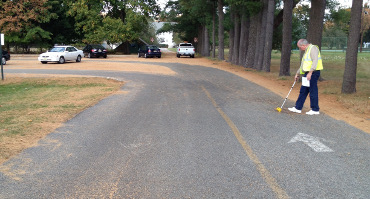 PTS offers a wide range of PMS services for roads, airports, and seaports as well
as both maintenance and asset management systems. Our personnel have years of
experience in conducting and implementing PMS for airports in accordance with
industry standards ASTM 5340-12, “Standard Test Method for Airport Pavement
Condition Index Surveys” and FAA AC 150/5380-6B, “Guidelines and Procedures for
Maintenance of Airport Pavements”. Additionally, PTS personnel have successfully
implemented PMS for roadway and parking networks including several military
installations in accordance with ASTM 6433-11, “Standard Practice for Roads and
Parking Lots Pavement Condition Index Surveys”. Proper management of pavement
networks and their assets enables PTS’s clients to optimize the decision making
process on rehabilitation and repair options, maintenance, and associated costs to
maximize their available resources.
PTS offers a wide range of PMS services for roads, airports, and seaports as well
as both maintenance and asset management systems. Our personnel have years of
experience in conducting and implementing PMS for airports in accordance with
industry standards ASTM 5340-12, “Standard Test Method for Airport Pavement
Condition Index Surveys” and FAA AC 150/5380-6B, “Guidelines and Procedures for
Maintenance of Airport Pavements”. Additionally, PTS personnel have successfully
implemented PMS for roadway and parking networks including several military
installations in accordance with ASTM 6433-11, “Standard Practice for Roads and
Parking Lots Pavement Condition Index Surveys”. Proper management of pavement
networks and their assets enables PTS’s clients to optimize the decision making
process on rehabilitation and repair options, maintenance, and associated costs to
maximize their available resources.
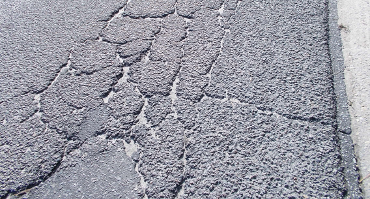 PTS has the specialized experience and ability to conduct either a Network-Level
pavement condition survey or a Project-Level pavement condition survey. All
airfield and roadway Pavement Condition Index (PCI) surveys are conducted in
accordance to industry standards ASTM 5340-12, “Standard Test Method for Airport
Pavement Condition Index Surveys”, FAA AC 150/5380-6B, “Guidelines and Procedures
for Maintenance of Airport Pavements”, and ASTM 6433-11, “Standard Practice for
Roads and Parking Lots Pavement Condition Index Surveys”.
PTS has the specialized experience and ability to conduct either a Network-Level
pavement condition survey or a Project-Level pavement condition survey. All
airfield and roadway Pavement Condition Index (PCI) surveys are conducted in
accordance to industry standards ASTM 5340-12, “Standard Test Method for Airport
Pavement Condition Index Surveys”, FAA AC 150/5380-6B, “Guidelines and Procedures
for Maintenance of Airport Pavements”, and ASTM 6433-11, “Standard Practice for
Roads and Parking Lots Pavement Condition Index Surveys”.
 PTS has completed development of two custom built, state-of-the-art roughness
profilers. Our profilers are capable of recording the data necessary for analysis
of Single Event Bumps and Profile Roughness of runways and taxiways per FAA
Advisory Circular 150/5380-9, "Guidelines and Procedures for Measuring Airfield
Pavement Roughness." The FAA-developed ProFAA software will be used for the
analysis of the recorded data. The recorded profile data is imported into PROFAA
and is used to compute various indexes that characterize smoothness in terms of
the Boeing Bump Index (BBI), simulated straight edge, and International Roughness
Index (IRI). The profilers can also measure runway grooving geometry. Custom
ProGroov software provides summary grooving statistics for groove width, depth,
and spacing over specified section lengths.
PTS has completed development of two custom built, state-of-the-art roughness
profilers. Our profilers are capable of recording the data necessary for analysis
of Single Event Bumps and Profile Roughness of runways and taxiways per FAA
Advisory Circular 150/5380-9, "Guidelines and Procedures for Measuring Airfield
Pavement Roughness." The FAA-developed ProFAA software will be used for the
analysis of the recorded data. The recorded profile data is imported into PROFAA
and is used to compute various indexes that characterize smoothness in terms of
the Boeing Bump Index (BBI), simulated straight edge, and International Roughness
Index (IRI). The profilers can also measure runway grooving geometry. Custom
ProGroov software provides summary grooving statistics for groove width, depth,
and spacing over specified section lengths.
 PTS has the capability to perform Non-Destructive Testing (NDT) with either our
in-house Falling Weight Deflectometer (FWD) or our in-house Heavy Weight
Deflectometer (HWD). FWD/HWD testing, often referred to as NDT, simulates a moving
wheel load of either a vehicle for roadway pavements or an aircraft for airport
pavements. For large civil international airports, PTS has the ability to perform
HWD testing to simulate the moving wheel load of large trucks, cranes, and large
aircraft, such as the Airbus A-380.
PTS has the capability to perform Non-Destructive Testing (NDT) with either our
in-house Falling Weight Deflectometer (FWD) or our in-house Heavy Weight
Deflectometer (HWD). FWD/HWD testing, often referred to as NDT, simulates a moving
wheel load of either a vehicle for roadway pavements or an aircraft for airport
pavements. For large civil international airports, PTS has the ability to perform
HWD testing to simulate the moving wheel load of large trucks, cranes, and large
aircraft, such as the Airbus A-380.
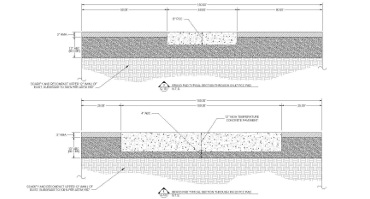 PTS has the ability to conduct both Network-Level and Project-Level pavement
evaluations for new pavement structures and for rehabilitation projects of both
roadway and airfield pavements. Network-Level pavement evaluations are typically
conducted over the entire (or a large portion of) the network of pavements. The
intent of a Network-Level pavement evaluation is to provide the client an overview
of the current functional and structural condition of the entire pavement network,
while forecasting future conditions.
PTS has the ability to conduct both Network-Level and Project-Level pavement
evaluations for new pavement structures and for rehabilitation projects of both
roadway and airfield pavements. Network-Level pavement evaluations are typically
conducted over the entire (or a large portion of) the network of pavements. The
intent of a Network-Level pavement evaluation is to provide the client an overview
of the current functional and structural condition of the entire pavement network,
while forecasting future conditions.
 PTS has the ability to conduct pavement training, research, and software
development projects for airport, highway, and seaport pavement systems which
supply its clients with the required information and tools needed to design,
build, repair, and maintain better performing and longer lasting pavements, while
optimizing costs. PTS personnel have also performed numerous MicroPAVER and
Pavement Condition Index (PCI) training courses for various military
installations, civil airport authorities, and city and county government agencies.
PTS has the ability to conduct pavement training, research, and software
development projects for airport, highway, and seaport pavement systems which
supply its clients with the required information and tools needed to design,
build, repair, and maintain better performing and longer lasting pavements, while
optimizing costs. PTS personnel have also performed numerous MicroPAVER and
Pavement Condition Index (PCI) training courses for various military
installations, civil airport authorities, and city and county government agencies.
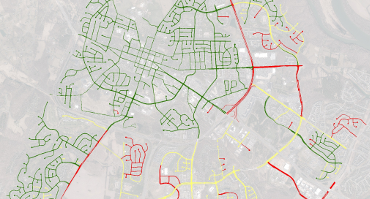 PTS has the ability to develop and manipulate GIS shapefiles for pavement
networks. GIS generated maps allow for the graphical display of information
contained in a pavement network (airport or roadway). PTS utilizes the latest
versions of AutoCAD Map and ArcMap to create and manipulate shapefiles at both the
section and sample unit level for a pavement network.
PTS has the ability to develop and manipulate GIS shapefiles for pavement
networks. GIS generated maps allow for the graphical display of information
contained in a pavement network (airport or roadway). PTS utilizes the latest
versions of AutoCAD Map and ArcMap to create and manipulate shapefiles at both the
section and sample unit level for a pavement network.
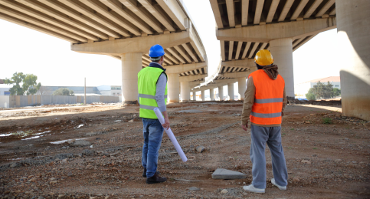 PTS personnel have years of experience and the ability to conduct on-call
construction consultation to handle any Contractor Requests for Information (RFIs)
and any potential plan and specification modifications during the bidding and
construction phases of pavement repair and rehabilitation projects. PTS also
offers quality control and construction inspection services.
PTS personnel have years of experience and the ability to conduct on-call
construction consultation to handle any Contractor Requests for Information (RFIs)
and any potential plan and specification modifications during the bidding and
construction phases of pavement repair and rehabilitation projects. PTS also
offers quality control and construction inspection services.
 PTS has added experienced geotechnical staff and we now offer geotechnical
investigation and engineering services. Our staff has both local and national
experience performing geotechnical evaluations for roadway subgrade
investigations, subgrade stabilization, large rock cut slope design, shallow and
deep foundations for both transportation and vertical construction projects, slope
stability analyses, landslide stabilization design, and retaining walls.
PTS has added experienced geotechnical staff and we now offer geotechnical
investigation and engineering services. Our staff has both local and national
experience performing geotechnical evaluations for roadway subgrade
investigations, subgrade stabilization, large rock cut slope design, shallow and
deep foundations for both transportation and vertical construction projects, slope
stability analyses, landslide stabilization design, and retaining walls.